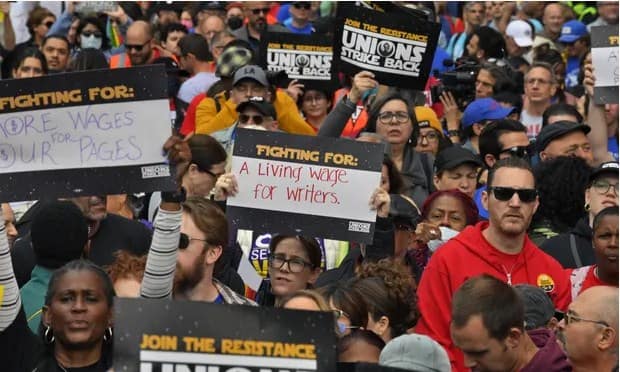I’m a working screenwriter with more than two decades of experience on UK shows such as Call the Midwife, Midsomer Murders, New Tricks and Fat Friends. I’m also chair of the Writers’ Guild of Great Britain (WGGB), a union that represents about 3,000 writers across TV, film, theatre, books, video games and radio. Today, we’re joining colleagues from over 20 countries in a Global Day of Solidarity, organised by the International Affiliation of Writers Guilds and Federation of Screenwriters in Europe.
Screenwriters in the US have warned that their profession is increasingly being reduced to a gig economy. Despite the streaming boom producing hundreds of new TV shows, media conglomerates and streamers seem only too willing to sacrifice workers’ rights for their bottom line, using the transition to streaming as an excuse to cut writer pay and erode working conditions.
Recent analysis carried out by the Writers Guild of America (WGA), representing 11,500 writers, whose members have been on strike since 2 May, found that the number of TV writers on the lowest levels of pay had grown from 33% to 50% over the last decade. Film writers’ pay had declined by 14% in the last five years.
This unsustainable situation does not just threaten to erode the livelihoods and working conditions of writers in the US. It also affects writers across the globe. While the famous faces on the WGA picket lines have made the headlines, it is the jobbing writers who produce episode after episode of our favourite shows that are most in need of a better deal.
Lisa Takeuchi Cullen, the vice president of WGA East, recently spoke of a “broken system”, with writers getting by on 10 weeks of work a year and royalties cheques amounting to pennies. Writers’ stories “are resonating with the public”, she said. “We are not the elite. We are just like them. We are them.”
The Writers’ Guild of Great Britain has a history of activism. We negotiated our very first agreement in 1961, laying down basic fees for TV drama writers. We have also staged numerous campaigns: supporting the Public Lending Right for authors in the 1970s; supporting a publicly funded BBC; protesting against homophobic local government legislation in the 1980s; and protesting against bullying and harassment in the creative industries.
The circumstances that face writers today are different but no less challenging. AI is threatening to replace writers with chatbots that can generate scripts, which in turn threatens to plunder our intellectual property rights by combing content from the web. Meanwhile, tech companies are turning into commissioners and producers; for them, creators are simply business assets that can be exploited.
Trade union solidarity and resistance has never been more relevant, refashioned for a generation where globalisation, technology and corporate greed are diminishing workers’ rights. That’s why writers around the world are taking to the streets today, and will continue refusing to take work in the WGA’s jurisdiction for the duration of their strike.
Here in the UK we face obstacles of our own. Trade unions and the right to strike – even the right to protest – have faced sustained attacks by successive governments, who have incrementally eroded collective bargaining rights to allow companies to engage non-union workers or refuse to recognise unions at all.
Unsurprisingly, this has contributed to lower rates of pay and the worsening of terms and conditions. Most UK writers work on freelance contracts and many are navigating a cost-of-living crisis. It was already hard to break into the industry, or sustain a writing career. Now, it’s even harder.
Despite these hurdles, the Writers’ Guild of Great Britain has succeeded in negotiating agreements with a number of broadcasters and producers. We win pay rises for our members annually, and have secured digital agreements compensating writers for the secondary use and sale of their work. Our strong public broadcasting tradition in the UK is a precious foil to the conglomerates that show little regard for the value of creative labour, and we continue to campaign to maintain these important but increasingly fragile services.
These wins are the result of hard fought, lengthy and gruelling negotiations and campaigns. And this is exactly what the Writers Guild of America is doing now. Collective action is not a thing of the past, or a fleeting hashtag on your Twitter feed. If writers are good at one thing, it is anticipating how the story turns out. We have the power to face down a Doomsday-style ending where robots, big tech and billionaire business leaders triumph. We can write a happier one – and we will.

